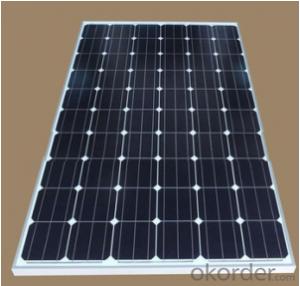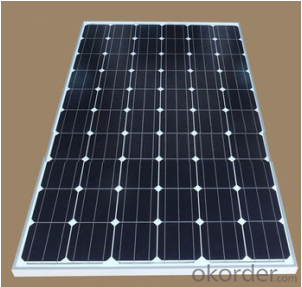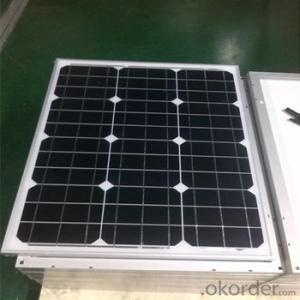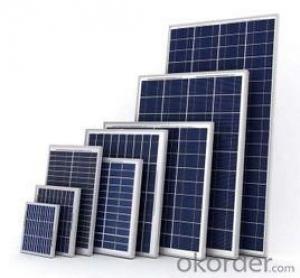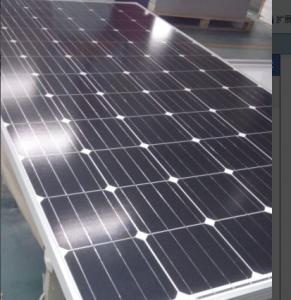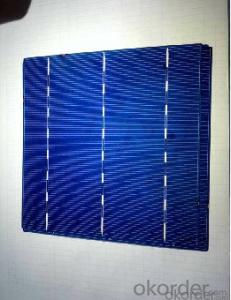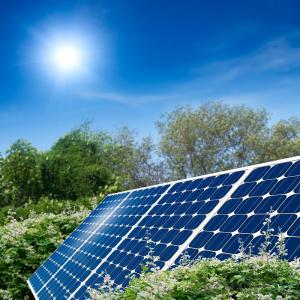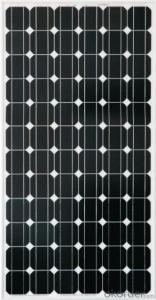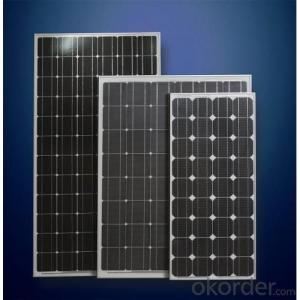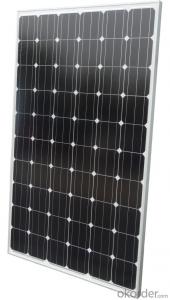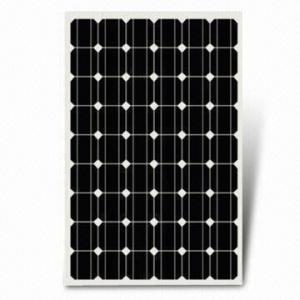Solar Panels Tennessee - Monocrystalline Solar Module 205w-310w
- Loading Port:
- Shanghai
- Payment Terms:
- TT OR LC
- Min Order Qty:
- 100 pc
- Supply Capability:
- 30000 pc/month
OKorder Service Pledge
OKorder Financial Service
You Might Also Like
Description:
Solar Monocrystalline Series (205W—300W) l : High efficiency crystalline solar cell. Even if under the weak light, the solar module can produce maximum power output.
II Tempered glass (toughened glass): Anti-reflecting coating and high transmission rate glass increase the power output and mechanical strength of solar module.
III EVA and TPT: Using high quality EVA and TPT to prevent destroying and water.
IV AI frame: Without screw, rner connection. 6 holes on the frame can be installed easily.
V Junction box: Multi function junction box with water proof.
VI Long lifetime: ≥25 years; Less power decrease.
VII Good performance of preventing from atrocious weather such as wind and hails.
VIII Resisting moisture and etching effectively, not effected by geology.
Standard Test Conditions of Solar Monocrystalline Series :
The opto-electrical specifications shown below are stabilized values being measured at Standard Test Conditions, Irradiance: 1000W/m2, Spectrum: AM1.5 at 25°C, The info below is subject to manufacturing tolerances. Where appropriate minutes of measurement are available and are used for the dimensioning of the installation.
Advantages of Monocrystalline Silicon Solar Panel
• CNBM Solar performance guarantees for 25 years
• 12 years guarantee for workmanship
• Timeliness of delivery
Specification of Solar Monocrystalline Series
- Optimal permutation on solar cells to keep enough heat diffusion, decreases hot spot effect.
- High quality and anti-ageing EVA, weather resistance backside raw materials assure reliable solar panels.
- Passed 5400Pa mechanical loads testing by UL, can withstand bad and high mechanical load working environment.
- With good sealed performance, moisture resistant, aging resistance, high/low temperature resistant, the inner terminals of our junction box owns good electrical performance transmission. Bypass diodes used can avoide hot spot effect and damages to panels. Output cables and mating connectors are safe and reliable for installation application. Adopt weather resistance, sealed, good sticky silica gel when assembling.
- Strict quality inspection on each procedure and 100% electrical performance test to meet power requirements.
- 0~+3% power tolerance.
- classification for all the panels in order to improve the integral performance of system and solar panel life span.
- TUV、UL、MCS、CE、ROHS、Golden Sun certified
- Underwriting of 25years output power warranty by The People's Insurance Company of China.
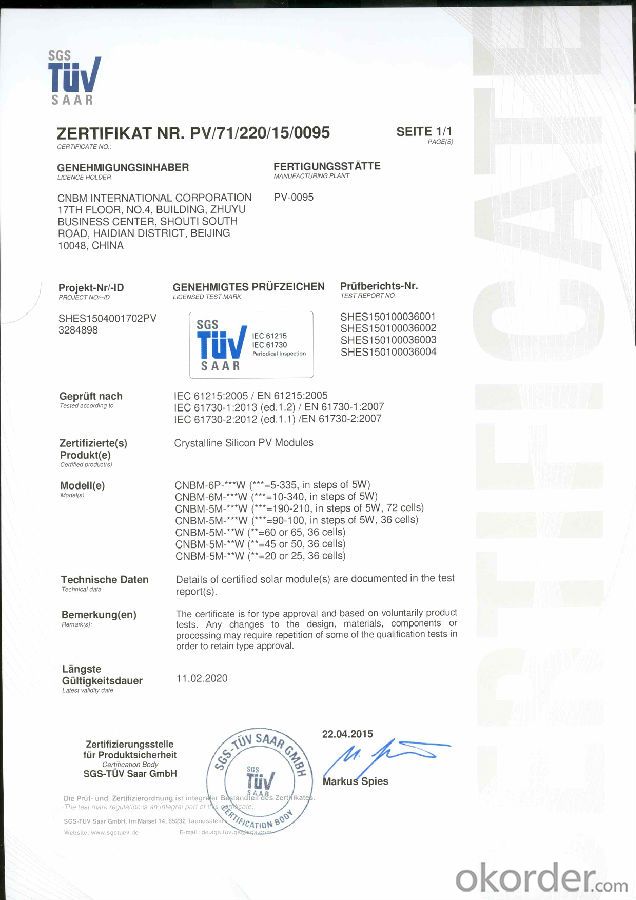
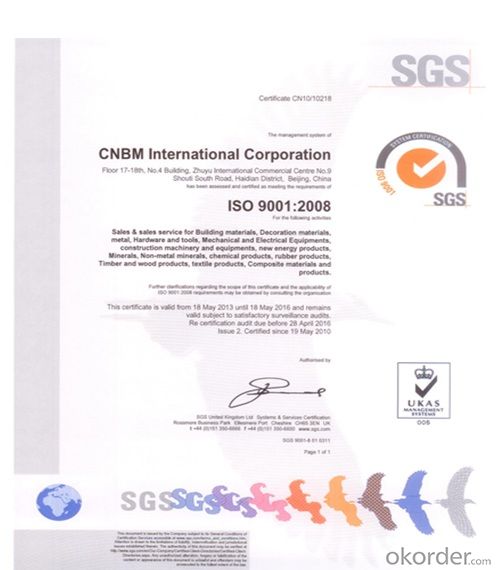
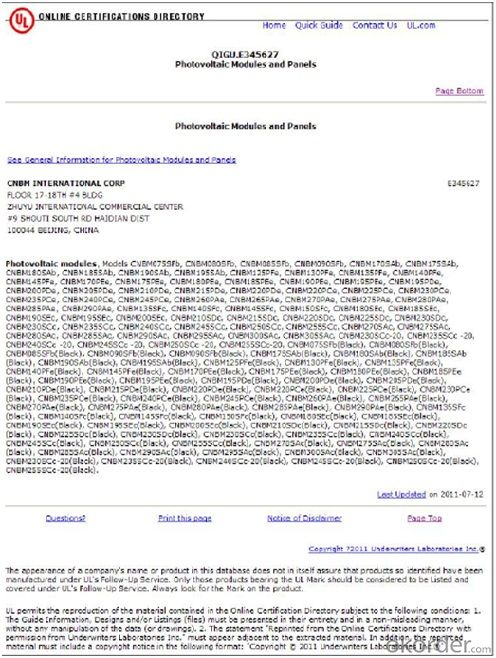
FAQ
We have organized several common questions for our clients,may help you sincerely:
①What price for each watt?
It depends on the quantity, delivery date and payment terms,
②What is your size for each module? Can you tell me the Parameter of your module?
We have different series of panels in different output, both c-Si and a-Si. Please take the specification sheet for your reference.
③Can you provide the peripheral products of the solar panels, such as the battery, controller, and inverter? If so, can you tell me how do they match each other?
Yes, we can, we have two companies for solar region, one is CNBM International, the other is CNBM engineering Co.
We can provide you not only the solar module but also the off grid solar system, we can also provide you service with on grid plant.
④What is your warranty system?
Our product performance guarantees for 25 years
• 12 years guarantee for workmanship
• Timeliness of delivery
• Quality Products certified (TÜV, UL, CE, ISO)
⑤How do you pack your products?
We have rich experience on how to pack the panels to make sure the safety on shipment when it arrives at the destination.
⑥ Can you do OEM for us?
Yes, we can.
⑦How long can we receive the product after purchase?
In the purchase of product within three working days, We will arrange the factory delivery as soon as possible. The pecific time of receiving is related to the state and position of customers.Commonly 7 to 10 working days can be served.
- Q: Can the solar panels available be coated with a material (to improve it's looks) and not alter it's efficiency?
- No. The only coatings I am aware of are those that reduce reflection so more light gets through the protective surface to the actual cells. Anything thing that affects appearance is going to be reflecting light back to the viewer and the photons of that light are not available for electricity or heat. If the appearance of the panels offends you, then they need to be concealed by a fence of panels around them that do not throw shadows on the panels.
- Q: K i'm almost ready to give up! I've bought every kind of pv I can think of, and I can see this technology will not be affordable in my lifetime.I conserve all I can (so far as to handwashing my laundry etc) I'm not rich, but I'm saving for a solar pv with decent amperage. I love tinkering with things if I see the point.All the cells i've seen are very weak. What PV would you buy? (all I need is to power my computer from a deep cycle 2 volt battery connected to an inverter)God Bless You
- For okorder . If powering a PC is your only goal, consider replacing the power supply in your PC with one that runs off native 2 volts (like the kind intended for RV's). Then you can avoid the 30% loss of energy in a cheap inverter. I think you will see a significant drop in the price of panels in the next couple years, by the way.
- Q: Can solar panels be integrated into windows?
- Yes, solar panels can be integrated into windows. This innovative technology is called Building Integrated Photovoltaics (BIPV), where solar cells are incorporated into the glass panels of windows. BIPV allows for the generation of renewable energy while still maintaining the functionality and transparency of windows.
- Q: I'm part of the Sustainability group at school, the school principal is a d**k and doesn't care about the environment, he only cares about money.Me and the group will be talking in front of him and the school council (the people in-charge of the school's money) To convince them to put solar panels on the school roofs.I know that it definitely will help the school save on electricity bills, but it WILL cost a lot of money to put them in.In the end we just wanna reduce carbon emissions!HELP :)
- Show live examples such as those in Northern CA where the schools working with private industry funded a complete solar installation for a school district. Yes it can be done!
- Q: Can solar panels be installed on water pumps?
- Yes, solar panels can be installed on water pumps. Solar-powered water pumps are a great alternative to traditional pumps as they harness energy from the sun to power the pumping system. This not only reduces reliance on fossil fuels but also makes these pumps more versatile and suitable for remote areas where electricity may not be readily available.
- Q: I want to add solar panels to my home. I was looking online and it seems there are so many different kinds! How does it hook up to the electrical grid? How much do I need for a 2000 sf home?
- There are different solar panels for different uses For a domestic home it all depends on how much electricity you are going to use per month or per year For a normal use home (2 adults, 2 children) I presume one need to install a panels that would produce about4 to 5000 Kilo wats of energy per year Based on the type and the out put of the panels the suppler and the person who is advising you will guide you how many panels you will be requiring to install Take a professional help They are better informed and also knowledgeable
- Q: The battery is 9ah and the solar panel is 20w
- Buy the proper charger or get a degree. Don't screw with making a charger for a lead acid battery of you don't know what you are doing. You could get hurt. You need a hell of a lot more than just a regulator.
- Q: Can solar panels be installed on a flat roof?
- Yes, solar panels can be installed on a flat roof. In fact, flat roofs are often considered ideal for solar panel installations due to their easy accessibility and potential for optimal sun exposure. Additionally, there are various mounting systems available that can be used to securely attach solar panels to flat roofs.
- Q: Do solar panels require a backup battery system?
- No, solar panels do not necessarily require a backup battery system. However, having a battery system can be beneficial as it allows for the storage of excess energy produced by the solar panels, which can be used during times when there is no sunlight or during power outages.
- Q: How do solar panels affect the aesthetics of a roof?
- Solar panels can have both positive and negative effects on the aesthetics of a roof. On one hand, they can enhance the visual appeal by giving the roof a modern and eco-friendly look. On the other hand, some people may find the appearance of solar panels less attractive or disruptive to the overall design of their roof. Ultimately, the impact on aesthetics largely depends on personal preferences and the design integration of the solar panels into the roof.
Send your message to us
Solar Panels Tennessee - Monocrystalline Solar Module 205w-310w
- Loading Port:
- Shanghai
- Payment Terms:
- TT OR LC
- Min Order Qty:
- 100 pc
- Supply Capability:
- 30000 pc/month
OKorder Service Pledge
OKorder Financial Service
Similar products
Hot products
Hot Searches
Related keywords
